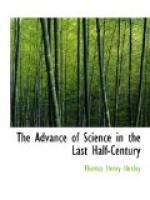[Sidenote: Hobbes.]
[Sidenote: Descartes.]
Bacon’s younger contemporary, Hobbes, casting aside the prudent reserve of his predecessor in regard to those matters about which the Crown or the Church might have something to say, extended scientific methods of inquiry to the phenomena of mind and the problems of social organisation; while, at the same time, he indicated the boundary between the province of real, and that of imaginary, knowledge. The ‘Principles of Philosophy’ and the ‘Leviathan’ embody a coherent system of purely scientific thought in language which is a model of clear and vigorous English style. At the same time, in France, a man of far greater scientific capacity than either Bacon or Hobbes, Rene Descartes, not only in his immortal ‘Discours de la Methode’ and elsewhere, went down to the foundations of scientific certainty, but, in his ‘Principes de Philosophie,’ indicated where the goal of physical science really lay. However, Descartes was an eminent mathematician, and it would seem that the bent of his mind led him to overestimate the value of deductive reasoning from general principles, as much as Bacon had underestimated it. The progress of physical science has been effected neither by Baconians nor by Cartesians, as such, but by men like Galileo and Harvey, Boyle and Newton, who would have done their work just as well if neither Bacon nor Descartes had ever propounded their views respecting the manner in which scientific investigation should be pursued.
[Sidenote: For a time the progress without fruits.]
The progress of science, during the first century after Bacon’s death, by means verified his sanguine prediction of the fruits which it would yield. For, though the revived and renewed study of nature had spread and grown to an extent which surpassed reasonable expectation, the practical results—the ’good to men’s estate’—were, at first, by no means apparent. Sixty years after Bacon’s death, Newton had crowned the long labors of the astronomers and the physicists, by coordinating the phenomena of solar motion throughout the visible universe into one vast system; but the ‘Principia’ helped no man to either wealth or comfort. Descartes, Newton, and Leibnitz had opened up new worlds to the mathematician, but the acquisitions of their genius enriched only man’s ideal estate. Descartes had laid the foundations of rational cosmogony and of physiological psychology; Boyle had produced models of experimentation in various branches of physics and chemistry; Pascal and Torricelli had weighed the air; Malpighi and Grew, Ray and Willoughby had done work of no less importance in the biological sciences; but weaving and spinning were carried on with the old appliances; nobody could travel faster by sea or by land than at any previous time in the world’s history, and King George could send a message from London to York no faster than King John might have done. Metals were worked from their ores by immemorial rule of thumb, and the centre of the iron trade of these islands was still among the oak forests of Sussex. The utmost skill of our mechanicians did not get beyond the production of a coarse watch.




